Natural Memory Boosters for Seniors: How to Keep Your Mind Sharp and Focused
Introduction
Aging is inevitable — but losing your memory doesn’t have to be.
Many people believe that forgetfulness, confusion, or “senior moments” are just part of getting older. The truth? While the brain does change with age, research shows that you can protect — and even enhance — your memory well into your golden years through simple lifestyle shifts, nutrition, and targeted natural supplements.
Your brain is remarkably adaptable. With the right nourishment and habits, it can grow new connections, repair old ones, and stay vibrant for decades.
In this guide, we’ll explore the most effective natural memory boosters for seniors, how they work, and how to combine them safely to keep your mind clear, focused, and resilient.
Looking for supplements for Memory And Focus? Click here.
🧬 Why Memory Declines with Age
As we age, several physiological changes occur that affect how we process, store, and retrieve information. Understanding these mechanisms helps explain why certain nutrients and herbs are so beneficial.
Reduced Neuroplasticity
Neuroplasticity — the brain’s ability to form and reorganize synaptic connections — naturally slows down with age. This affects learning, memory formation, and recovery from stress or injury.
Decreased Blood Flow to the Brain
Cerebral blood flow can decline by up to 15–20% in older adults, which limits oxygen and nutrient delivery to neurons. Over time, this contributes to cognitive fatigue and slower recall.
Oxidative Stress and Inflammation
Aging cells produce more free radicals — unstable molecules that damage brain tissue. This oxidative stress, combined with chronic inflammation, accelerates brain aging and can lead to memory decline.
Neurotransmitter Imbalance
Dopamine, acetylcholine, and serotonin — key chemicals for memory and focus — tend to decrease with age, contributing to mood fluctuations and cognitive fog.
Hormonal and Nutritional Factors
Lower estrogen, testosterone, and thyroid hormone levels can also affect mental sharpness. Nutrient absorption often declines with age, leading to deficiencies in B vitamins, magnesium, and omega-3 fatty acids — all essential for memory function.
The good news: all of these processes can be slowed, balanced, or even reversed through proper diet, supplementation, and lifestyle choices.
🌿 The 10 Best Natural Memory Boosters for Seniors

Let’s look at the most scientifically backed nutrients and herbs that support cognitive longevity and memory recall in older adults.
🐟 Omega-3 Fatty Acids (EPA + DHA)
Why it matters:
Omega-3s are the building blocks of the brain. DHA (docosahexaenoic acid) makes up about 30% of your brain’s structural fat, while EPA (eicosapentaenoic acid) reduces inflammation that can impair neuron communication.
What it does:
Improves memory recall and focus
Protects brain cells from aging
Supports neurotransmitter signaling
Reduces inflammation in the brain
Science says:
A 2016 study published in Frontiers in Aging Neuroscience found that seniors who took omega-3 supplements for six months had improved cognitive performance and increased brain volume in regions associated with memory.
How to take it:
Dose: 1,000–2,000 mg/day combined EPA + DHA
Form: Fish oil, krill oil, or algae oil (vegan)
Pro tip: Take it with meals that contain healthy fats for better absorption.
🌿 Ginkgo Biloba
Why it matters:
Known as the “memory tree,” Ginkgo Biloba is one of the oldest and most researched natural remedies for brain health.
What it does:
Enhances blood flow to the brain
Increases oxygen and glucose delivery
Protects neurons from oxidative damage
Improves short-term and working memory
Science says:
A review of 21 clinical trials found that Ginkgo improved cognitive performance and reduced memory-related symptoms in seniors with mild cognitive impairment.
How to take it:
Dose: 120–240 mg/day (standardized to 24% flavone glycosides)
Timing: Take in the morning for better focus
Note: Avoid combining with blood-thinning medications without medical advice.
🍄 Lion’s Mane Mushroom
Why it matters:
This white, shaggy mushroom stimulates nerve growth factor (NGF) — a protein that helps neurons grow, repair, and communicate.
What it does:
Encourages brain cell regeneration
Improves recall and cognitive speed
May protect against neurodegenerative diseases
Science says:
A 2009 Japanese study found that seniors who took Lion’s Mane daily for 16 weeks showed significant improvements in cognitive function compared to placebo.
How to take it:
Dose: 500–1,000 mg/day (dual-extracted supplement)
Form: Capsules, powders, or functional coffees
Pro tip: Consistency matters — effects build over 2–3 months.
🌼 Bacopa Monnieri
Why it matters:
Bacopa is an adaptogenic herb used in Ayurvedic medicine for centuries to boost learning, memory, and stress resilience.
What it does:
Enhances memory formation and retention
Reduces anxiety and mental fatigue
Increases levels of acetylcholine (learning neurotransmitter)
Science says:
A 2014 review in Evidence-Based Complementary and Alternative Medicine concluded that Bacopa improves memory recall and cognitive processing speed, particularly in older adults.
How to take it:
Dose: 300–600 mg/day of standardized extract (50% bacosides)
Timing: Take with meals containing fat for absorption
Note: Works gradually; results appear after 8–12 weeks.
💊 Phosphatidylserine (PS)
Why it matters:
PS is a naturally occurring phospholipid that makes up the outer membrane of brain cells, helping them transmit signals efficiently.
What it does:
Supports memory recall and learning ability
Reduces “brain fog”
Protects neurons from stress-induced damage
Science says:
In a 2010 Neurobiology of Aging study, older adults taking PS for 12 weeks showed improved memory scores and verbal recall compared to placebo.
How to take it:
Dose: 100–300 mg/day
Form: Soy-free sunflower-derived supplements are best for sensitive individuals.
🌿 Rhodiola Rosea
Why it matters:
Chronic stress can drain the brain’s energy and impair focus. Rhodiola is an adaptogen that helps your body adapt to stress by balancing cortisol and improving mental resilience.
What it does:
Reduces fatigue and brain fog
Enhances concentration and motivation
Supports dopamine and serotonin balance
Science says:
A 2012 study found that Rhodiola supplementation significantly reduced mental fatigue and improved cognitive performance in participants under stress.
How to take it:
Dose: 200–400 mg/day (standardized to 3% rosavins, 1% salidroside)
Timing: Take in the morning to avoid sleep interference.
🧩 CoQ10 (Coenzyme Q10)
Why it matters:
CoQ10 supports mitochondrial energy production — crucial for brain cells, which require massive amounts of energy to function.
What it does:
Boosts brain energy and alertness
Protects neurons from oxidative stress
Supports cardiovascular and overall vitality
Science says:
Studies suggest that CoQ10 supplementation improves mitochondrial efficiency and may help slow age-related cognitive decline.
How to take it:
Dose: 100–200 mg/day
Form: Ubiquinol (more bioavailable form)
Timing: Take with meals containing fats.
🧠 B Vitamins (B6, B9, B12)
Why they matter:
These vitamins are critical for producing neurotransmitters, maintaining healthy nerves, and regulating homocysteine — a compound linked to cognitive decline when elevated.
What they do:
Improve energy metabolism in brain cells
Enhance focus and memory formation
Protect against brain shrinkage with aging
Science says:
A study published in Proceedings of the National Academy of Sciences found that seniors who took B6, B9, and B12 supplements had 30% slower brain atrophy than those on placebo.
How to take them:
Dose: B-complex with active forms (methylcobalamin and methylfolate)
Timing: Take in the morning with food.
Looking for supplements for Memory And Focus? Click here.
🍊 Curcumin (from Turmeric)
Why it matters:
Curcumin is the active compound in turmeric, known for its anti-inflammatory and antioxidant properties. Chronic inflammation accelerates brain aging and memory decline.
What it does:
Lowers inflammation in brain tissue
Boosts serotonin and dopamine
Improves mood and focus
Science says:
A UCLA study found that adults who took curcumin for 18 months experienced significant improvements in memory and attention, along with reduced amyloid plaque buildup.
How to take it:
Dose: 500–1,000 mg/day (with piperine for absorption)
Pro tip: Take with fats or black pepper for best bioavailability.
🌸 Magnesium
Why it matters:
Magnesium is essential for over 300 biochemical reactions in the body, including those involved in nerve signaling, memory, and relaxation.
What it does:
Improves sleep quality and memory consolidation
Calms an overactive nervous system
Supports learning and synaptic plasticity
Science says:
Magnesium L-threonate — a form that crosses the blood-brain barrier — has been shown to enhance short-term and long-term memory in older adults.
How to take it:
Dose: 200–400 mg/day (glycinate or threonate forms are best)
Timing: Evening, before bed.
🧘 Lifestyle Habits That Enhance Memory Naturally
Supplements can be powerful, but they work best when combined with daily habits that support brain function.
💤 Prioritize Quality Sleep
Sleep is when your brain consolidates new memories. Seniors often struggle with insomnia or light sleep — so creating a calming nighttime routine can make all the difference.
Tips:
Maintain a consistent sleep schedule
Limit caffeine after noon
Use magnesium or chamomile tea before bed
Keep your bedroom cool, dark, and quiet
🚶 Move Your Body
Exercise increases blood flow and oxygen to the brain and stimulates brain-derived neurotrophic factor (BDNF), which supports neuron growth.
Even light daily movement helps. Try:
Walking 20–30 minutes daily
Yoga or tai chi
Dancing — which challenges coordination and memory simultaneously
🧘 Manage Stress
Chronic stress elevates cortisol, which damages the hippocampus over time. Mindfulness, breathwork, and gentle meditation can lower stress hormones and improve clarity.
Try this simple breathwork exercise:
Inhale through your nose for 4 seconds
Hold for 4
Exhale through your mouth for 6
Repeat for 5 minutes.
Want to try Breathwork? Click Here.
🥗 Eat a Brain-Healthy Diet
Your brain thrives on nutrients — especially those found in the Mediterranean diet.
Focus on:
Fatty fish (salmon, sardines)
Olive oil and avocados
Leafy greens (spinach, kale)
Berries and nuts
Whole grains and legumes
Avoid excessive sugar and processed foods, which increase inflammation and impair memory.
🧩 Challenge Your Mind Daily
Your brain is like a muscle — it strengthens through use.
Keep learning, reading, and exploring new hobbies. Try:
Crossword or Sudoku puzzles
Learning a new language or musical instrument
Playing strategy games
Social activities that involve conversation and laughter
💊 Sample Daily Memory-Boosting Routine
| Time | Supplement | Benefit |
|---|---|---|
| Morning | Omega-3 + B-Complex + Rhodiola | Boost focus & alertness |
| Midday | Ginkgo Biloba + Bacopa | Enhance recall & attention |
| Evening | Lion’s Mane + Magnesium | Repair neurons & promote restful sleep |
| Daily (with meals) | Curcumin + CoQ10 | Protect against inflammation & fatigue |
⚠️ Safety and Considerations for Seniors
While natural supplements are generally safe, seniors should take special care with dosages and potential interactions.
Consult your doctor before starting new supplements, especially if you take blood thinners, antidepressants, or diabetes medications.
Start low, go slow: Begin with smaller doses and increase gradually.
Watch for cumulative effects: Some herbs may lower blood pressure or thin the blood.
Quality matters: Choose products that are third-party tested for purity and potency.
🌿 The Power of Consistency
Improving memory and cognition naturally isn’t about quick fixes. Most herbs and nutrients work gradually, building resilience over weeks or months.
What’s important is consistency — feeding your brain the right nutrients every day while maintaining a supportive environment of sleep, connection, and movement.
Over time, you’ll notice:
Sharper recall
Better focus and multitasking
Improved mood and motivation
Greater confidence in daily tasks
🧭 Final Thoughts: Aging Gracefully, Mentally and Emotionally
Aging can be empowering when you take an active role in your health. Your brain — just like your muscles or heart — can stay strong with proper care.
By combining natural supplements, nutrient-dense foods, stress management, and mental stimulation, you’re not only improving memory; you’re supporting the emotional and creative side of your mind as well.
It’s never too late to start. Whether you’re in your 50s, 70s, or beyond, these strategies can help you stay clear-headed, curious, and full of life for years to come.
🧠 Quick Reference: Top Natural Memory Boosters for Seniors
| Supplement | Key Benefit | Best Time to Take |
|---|---|---|
| Omega-3 | Brain structure & anti-inflammatory support | Morning |
| Ginkgo Biloba | Blood flow & recall enhancement | Morning |
| Bacopa Monnieri | Learning & memory formation | Midday |
| Lion’s Mane Mushroom | Neuron repair & brain growth | Evening |
| Phosphatidylserine | Focus & communication between neurons | Afternoon |
| Rhodiola Rosea | Stress resilience & energy | Morning |
| CoQ10 | Cellular energy & brain vitality | Midday |
| Curcumin | Anti-inflammatory & antioxidant | With meals |
| B Vitamins | Neurotransmitter support | Morning |
| Magnesium | Relaxation & memory consolidation | Evening |
Related Posts
-

Nootropics That Promote Calm and Rest
Explore the world of calming nootropics — natural brain enhancers that promote relaxation, better focus, and deeper rest. Learn how L-Theanine, magnesium, ashwagandha, and other adaptogens help balance your nervous system, reduce stress, and support restorative sleep.
-

Best Natural Supplement Stack for Sleep
Discover the best natural supplement stack for deep, restorative sleep. Learn how nutrients like magnesium, L-theanine, glycine, and calming herbs such as chamomile and ashwagandha work together to relax your body, calm your mind, and improve sleep quality—naturally and safely.
-

Combining L-Theanine and Magnesium for Sleep: A Calm Night, Naturally
Discover how combining L-Theanine and Magnesium can help you drift into deep, restorative sleep. Learn how this natural duo calms the mind, relaxes the body, and supports your nervous system—without grogginess the next morning.
-

How to Sleep Better After Intense Workouts
Struggling to fall asleep after a tough workout? Learn how to optimize your post-training recovery with nutrition, hydration, and science-backed sleep strategies. Discover how to calm your nervous system, balance hormones, and wake up fully recharged for your next session.
-

Ashwagandha and Valerian: A Bedtime Combo for Deep Rest and Emotional Reset
Discover the calming synergy of Ashwagandha and Valerian root, two natural sleep aids that help quiet the mind, ease anxiety, and promote deeper rest. Learn how this herbal duo supports the nervous system, balances stress hormones, and restores emotional peace — without next-day grogginess.
-

How to Create a Resilience-Boosting Diet
Discover how to build emotional and physical strength from the inside out with a resilience-boosting diet 🍎. Learn which foods stabilize your mood, how supplements like magnesium and omega-3s strengthen your stress response, and why pairing nutrition with breathwork and therapy creates lasting calm, focus, and vitality 🌿💪.
-

Best Teas and Herbal Blends for Calmness: Nature’s Way to Restore Inner Peace
Ashwagandha, the ancient adaptogenic herb, helps your body find balance during stress. Known as “Indian ginseng,” it supports cortisol regulation, boosts energy, and restores calm clarity. Discover how this powerful root promotes resilience, emotional balance, and steady vitality — one cup at a time. 🌸
-

Parenting and Emotional Strength: How to Raise Children Without Losing Yourself
Empathy is the bridge that connects hearts — the quiet power to understand, feel, and support another’s emotions without judgment. Learn how empathy strengthens relationships, enhances communication, and cultivates deeper compassion in everyday life. 🌿
-

How to Bounce Back from Public Failure: Reclaiming Confidence, Purpose, and Power
Visualization is more than imagination — it’s brain training for resilience. By picturing calm, success, or healing, you activate the same neural pathways as real experience. Learn how daily visualization rewires your brain for confidence, emotional balance, and recovery from stress. ✨
-

Coping with Financial Stress Through Resilience: How to Stay Grounded When Money Feels Tight
Body awareness is the foundation of emotional resilience. By tuning into your body’s signals — tension, fatigue, or calm — you learn to recognize stress before it overwhelms you. Discover how mindfulness, gentle movement, and breathwork can deepen your connection with your body and restore balance from the inside out. 🧘
-

How to Stay Positive During Chronic Illness: A Guide to Emotional Strength and Hope
Creativity is more than art — it’s a form of healing. Whether through painting, writing, music, or small acts of expression, creativity helps release emotion, calm the nervous system, and reconnect you to joy. Discover how to use creativity as a tool for emotional balance, resilience, and self-discovery. 🌿
-

Resilience Tips for Caregivers: How to Stay Strong While Caring for Others
Joy isn’t the absence of pain — it’s the quiet strength to find light even in challenging times. Cultivating joy through small daily moments restores balance, releases stress, and reminds you of life’s beauty. Learn how to reconnect with authentic happiness, rebuild emotional energy, and nurture your nervous system through gratitude, presence, and play. 🌿
-

Building Resilience After a Breakup: How to Heal, Rebuild, and Rise Stronger
Social connection is one of the strongest predictors of emotional resilience. During difficult times, genuine relationships act as anchors — calming the nervous system, reducing stress hormones, and helping you regain perspective. Learn how cultivating real human connection can strengthen your mind, heart, and overall well-being. 🌿
-

How to Stay Emotionally Strong During Job Loss
Your emotions are powered by brain chemistry — a delicate balance of neurotransmitters like serotonin, dopamine, and cortisol. When these chemicals work in harmony, you feel calm, focused, and resilient. Learn how daily habits, nutrition, and mindfulness can support your brain chemistry and boost emotional well-being naturally. 🌿
-

The Role of Hormones in Emotional Stability: How Your Chemistry Shapes Your Calm
Hormones shape more than your body — they shape your emotions, resilience, and sense of calm. From cortisol to serotonin, these chemical messengers influence how you react to stress, connect with others, and recover from challenges. Learn how to balance your hormones naturally to build lasting emotional stability and harmony within. 💫
-

Mitochondria and Emotional Energy: The Cellular Power Behind Your Mood
Breathwork is one of the most powerful tools for emotional regulation and cellular balance. Through intentional breathing, you can calm your nervous system, increase oxygen flow to the brain, and even support mitochondrial energy. Learn how conscious breathing connects body and mind — transforming stress into presence and emotional strength. 🌿
-

Inflammation and Its Impact on Mood Resilience: The Silent Link Between Body and Mind
Inflammation doesn’t just affect the body — it impacts the mind. Chronic inflammation alters brain chemistry, depletes serotonin, and makes emotional recovery harder. Learn how calming inflammation through nutrition, mindfulness, and sleep can restore balance, resilience, and a renewed sense of emotional strength. 💫
-

How Antioxidants Protect Emotional Well-being: The Hidden Link Between Oxidative Stress and Mental Health
Antioxidants do more than protect your body — they defend your mind. By neutralizing oxidative stress, antioxidants support serotonin, dopamine, and brain energy pathways that keep you calm, focused, and emotionally balanced. Discover how foods like berries, green tea, and dark chocolate nourish your brain, boost mood, and strengthen resilience from the inside out. 🌿✨
-

The HPA Axis and Emotional Health: The Hidden Bridge Between Stress and Mind
Neuroplasticity — the brain’s ability to rewire and adapt — is the foundation of emotional healing and resilience. When you face stress, trauma, or change, your neural pathways can reshape themselves to support new patterns of calm, focus, and self-awareness. Learn how daily practices like mindfulness, therapy, and breathwork strengthen neuroplasticity to transform emotional pain into personal growth. 🌸
-

Why Cortisol Control Is Key to Resilience: Mastering Stress to Build Emotional Strength
Controlling cortisol — the body’s main stress hormone — is the secret to lasting resilience. When cortisol levels stay balanced, your mind becomes clearer, emotions steadier, and energy more sustainable. Learn how breathwork, mindset shifts, adaptogens, and daily rhythms can help you calm your stress response and build true inner strength. 🌞💪
-

Dopamine’s Influence on Motivation and Recovery: Reigniting Drive and Balance
Healthy relationships are the foundation of emotional balance and resilience. Whether romantic, familial, or platonic, genuine connection releases dopamine, serotonin, and oxytocin — the brain’s “bonding trio” — helping us feel secure, motivated, and seen. Learn how trust, empathy, and communication not only strengthen your connections but also reshape your nervous system for deeper emotional well-being. 🌿🤝
-

The Role of Serotonin in Resilience: How This “Mood Molecule” Shapes Emotional Strength
Serotonin — often called the “resilience molecule” — plays a vital role in how we handle stress, regulate mood, and recover from emotional challenges. Beyond happiness, this powerful neurotransmitter helps balance the gut-brain axis, stabilize the nervous system, and support emotional flexibility. Learn how nutrition, sunlight, mindfulness, and adaptogens can naturally boost serotonin and strengthen your emotional resilience. 🌞🧠
-

How Neuroplasticity Supports Emotional Growth: Rewiring the Brain for Resilience
Neuroplasticity is the brain’s built-in power to grow, adapt, and heal — and it’s the foundation of emotional transformation. Every mindful breath, compassionate act, or reframed thought strengthens new neural pathways that support resilience and self-awareness. Learn how your brain rewires through daily habits, helping you turn emotional challenges into opportunities for growth and calm. 🌿
-

Tai Chi and Adaptogens for Mind-Body Balance: The Art of Harmonizing Energy and Resilience
Alchemy isn’t just an ancient science — it’s a timeless symbol of transformation and inner balance. By blending the physical and spiritual, alchemy teaches us that change begins from within. Just as metals are refined into gold, we too can transmute emotional pain, stress, and chaos into clarity and strength through mindful practice and self-awareness. 🌙✨
-

Cold Therapy and Emotional Control: Training the Mind Through the Body
Cold therapy isn’t just for athletes — it’s a tool for emotional mastery. By exposing your body to controlled cold, you train your nervous system to stay calm under stress, improving focus, mood, and resilience. This article explores the science of cold exposure, its impact on hormones and the vagus nerve, and how ice baths and cold showers can help you build emotional control, one breath at a time. 🧊🧘♂️
-

How Music Influences Emotional Recovery: The Healing Soundtrack of the Mind
Neuroplasticity — the brain’s ability to rewire and heal itself — is at the heart of emotional recovery. Through mindful habits, music, therapy, and consistent mental stimulation, your brain can form new connections that support resilience and well-being. Discover how neuroplasticity turns pain into growth, helping you rebuild balance, focus, and emotional strength. 🌿
-

Nature Therapy for Building Resilience: Reconnecting With the Healing Power of the Earth
Nature therapy helps rebuild emotional resilience by reconnecting you with the healing rhythms of the Earth. From forest walks to sunlight exposure, nature restores balance to your nervous system, lowers stress hormones, and teaches emotional adaptability. Learn how spending time outdoors can enhance mental clarity, calm anxiety, and awaken your natural capacity to heal. 🌞
-

Breathwork Techniques That Pair with Supplements: The Ultimate Synergy for Stress Relief and Mental Clarity
Breathwork and supplements create a powerful mind-body synergy for stress relief, focus, and energy. By combining intentional breathing with adaptogens, nootropics, and calming nutrients, you can naturally regulate cortisol, sharpen mental clarity, and boost emotional balance. This guide explores the best breathwork techniques and supplement pairings to help you feel centered, calm, and energized from the inside out. 🌿
-

Why Cortisol Balance Matters for Emotional Strength
Balancing cortisol — your body’s main stress hormone — is essential for emotional resilience. When cortisol is chronically high, your mind stays stuck in survival mode, leading to fatigue, anxiety, and emotional instability. This article explores how nutrition, supplements, breathwork, and therapy can help restore healthy cortisol rhythms, regulate the nervous system, and strengthen your ability to handle life’s challenges with calm focus and emotional strength. 🌿
-

Best Supplements for Students During Exam Season: Focus, Energy, and Memory Support
Studying late into the night? Learn which natural supplements can boost focus, memory, and mental stamina during exam season — without the crash. From omega-3s to Bacopa and Rhodiola, discover your brain’s ultimate exam support stack. 🎓🧠
-

The Link Between Stress, Cortisol, and Memory Loss
Chronic stress can quietly erode your memory — and cortisol is the key culprit. Learn how stress hormones affect the brain, why the hippocampus shrinks under pressure, and how natural strategies can help you restore memory and mental clarity. 🧠✨
-

How to Build a Daily Supplement Routine for Memory Health
Want to sharpen your memory and stay mentally clear? Learn how to build a daily supplement routine for memory health — from morning focus to nighttime brain repair. Discover science-backed nutrients that boost recall, focus, and long-term cognitive resilience. 🧠🌿
-

Top 5 Natural Supplements for Memory Recall and Focus
Looking to boost memory and concentration naturally? Discover the top 5 supplements — Bacopa, Ginkgo Biloba, Lion’s Mane, Rhodiola, and Phosphatidylserine — that enhance focus, recall, and long-term brain health. 🧠✨
-

Top Supplements to Balance Mood Naturally
From omega-3s to adaptogens, discover the top natural supplements proven to support emotional balance, reduce stress, and promote inner calm — safely and effectively. 🌿✨
-

Can Omega-3 Fatty Acids Help with Mood Disorders?
Omega-3 fatty acids do more than support heart health — they can help balance mood, reduce depression, and calm anxiety. Discover how EPA and DHA nourish your brain, fight inflammation, and support emotional well-being from within. 🌊🧠
-

Vitamin D and Mood: The Sunshine Vitamin for Emotional Balance
Could the key to emotional balance be as simple as a little sunlight? Discover how vitamin D — the sunshine vitamin — influences serotonin, reduces inflammation, and helps you feel more positive and resilient year-round. ☀️💛
-

The Role of Magnesium in Reducing Irritability and Low Mood
Feeling on edge or emotionally drained? Magnesium could be the missing link between your body and your mood. Discover how this essential mineral reduces irritability, balances neurotransmitters, and helps your nervous system find calm again. 🌿✨
-
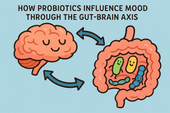
How Probiotics Influence Mood Through the Gut-Brain Axis
Discover how probiotics can do more than support your digestion—they can actually uplift your mood. This article explores the fascinating gut-brain axis and how balancing your gut bacteria through probiotics may help reduce anxiety, improve emotional stability, and support long-term mental well-being. 🌿🧠
-
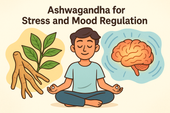
Ashwagandha for Stress and Mood Regulation
Discover how Ashwagandha, the powerful adaptogenic herb 🌿, helps your body manage stress and regulate mood. Learn how it balances cortisol, boosts GABA and serotonin, and supports emotional stability — helping you feel calm, focused, and resilient every day.
-
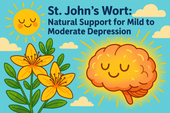
St. John’s Wort: Natural Support for Mild to Moderate Depression
Discover how St. John’s Wort, the “sunshine herb” 🌼, naturally supports mild to moderate depression. Learn how it boosts serotonin, balances mood, and promotes emotional resilience — with research showing its effectiveness compares to antidepressants, but with fewer side effects.
-
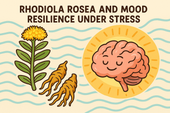
Rhodiola Rosea and Mood Resilience Under Stress
Discover how Rhodiola rosea helps your body adapt to stress 🌿. Learn how this powerful adaptogen balances cortisol, supports serotonin and dopamine, and strengthens emotional resilience — helping you stay calm, focused, and energized under pressure.
-

Chamomile and Lavender: Herbal Calm for Emotional Fluctuations
Discover how chamomile and lavender bring calm to emotional ups and downs 🌿. Learn how these two soothing herbs balance your nervous system, ease anxiety, and support restful sleep — naturally helping you find peace and emotional stability.
-
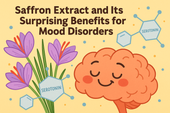
Saffron Extract and Its Surprising Benefits for Mood Disorders
Discover how saffron extract — the golden spice of joy 🌸 — can naturally support mood balance, ease anxiety, and lift mild depression. Learn what science says about its serotonin-boosting power, the ideal dosage, and how this ancient remedy compares to modern antidepressants.
-
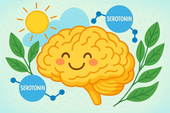
5-HTP and Serotonin: A Natural Path to Lifting Mood
Discover how 5-HTP naturally boosts serotonin 🌞 — the neurotransmitter behind mood, sleep, and emotional balance. Learn how this plant-derived compound supports happiness, reduces anxiety, and improves rest by helping your brain create more serotonin the gentle, natural way.
-
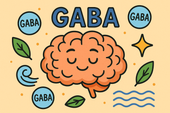
GABA Supplements for Reducing Anxiety and Mood Swings
Discover how GABA supplements can help reduce anxiety and balance mood naturally 🌿. Learn how this calming neurotransmitter works to quiet the mind, ease stress, and improve sleep — plus which nutrients and habits can boost your body’s own GABA production for long-term emotional stability.
-
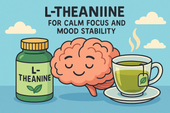
L-Theanine for Calm Focus and Mood Stability
Discover how L-theanine, the calming compound found in green tea 🍵, promotes focus, relaxation, and mood stability. Learn the science behind how it balances neurotransmitters, reduces stress hormones, and enhances clarity — helping you stay centered, calm, and productive without sedation.
-
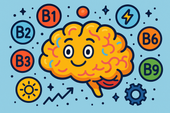
B Vitamins and Brain Chemistry: Supporting Energy and Emotional Balance
Discover how B vitamins power your brain chemistry ⚡. Learn how B6, B9, and B12 support serotonin, dopamine, and energy production — helping boost focus, mood, and emotional balance. From diet to supplements, explore how this vital nutrient group keeps your mind resilient and your energy steady.
-

N-Acetyl Cysteine (NAC) and Mood Disorders: What the Research Says
Learn how N-Acetyl Cysteine (NAC) supports brain health and mood balance 🧠. Discover how this antioxidant helps reduce oxidative stress, regulate glutamate, and improve emotional stability in depression, bipolar disorder, and anxiety — backed by cutting-edge psychiatric research.
-

Supplements for Bipolar Disorder: What May Support Stability
Discover the best supplements for bipolar disorder 🌿 that may support emotional stability and brain health. Learn how nutrients like omega-3s, magnesium, vitamin D, and NAC can help reduce inflammation, balance neurotransmitters, and complement traditional treatment safely.

















































